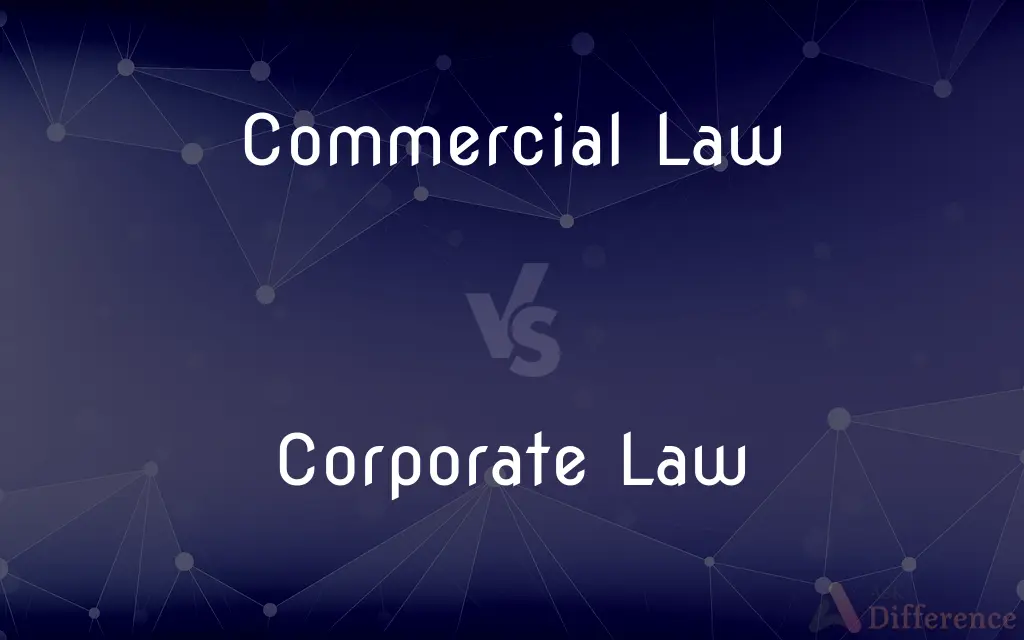Commercial Law vs. Corporate Law — What's the Difference?
Edited by Tayyaba Rehman — By Fiza Rafique — Published on March 29, 2024
Commercial law governs business and commercial transactions, focusing on the sale and distribution of goods, while corporate law deals with the formation, operations, and dissolution of corporations, emphasizing corporate structure and governance.

Difference Between Commercial Law and Corporate Law
Table of Contents
ADVERTISEMENT
Key Differences
Commercial law, also known as trade law, encompasses the legal principles applied to the rights, relations, and conduct of persons and businesses engaged in commerce, merchandising, trade, and sales. It includes areas such as contracts, sale of goods, and business transactions. This branch of law ensures that trade is conducted fairly and that the rights of both parties in a transaction are protected, dealing with issues like warranties, contract breaches, and consumer protection.
Corporate law, in contrast, focuses specifically on companies and their formation, operation, governance, and dissolution. It addresses the rights and obligations of all the major stakeholders in a corporation, including shareholders, directors, employees, creditors, and other parties. Corporate law structures the legal framework within which corporations operate, covering areas like corporate finance, mergers and acquisitions, and corporate governance, ensuring that businesses comply with statutory requirements and regulations.
One key difference is the scope of their application. Commercial law has a broader reach, affecting all businesses and commercial transactions, regardless of the business form. It applies to individuals, partnerships, corporations, and other entities engaged in commerce. Corporate law, however, is specialized to corporations, focusing on issues like corporate governance, equity, and the legal mechanisms that define the relationships within the corporate structure.
The nature of the legal issues each addresses also differs significantly. Commercial law deals with general commercial transactions, including the sale and supply of goods and services, and is concerned with aspects like contract laws and trade practices. Corporate law, meanwhile, delves into the complexities of corporate structure, including the formation of companies, the issuance of stock, board meetings, shareholder rights, and corporate liability.
Both areas of law aim to facilitate business, whereas commercial law does so by regulating transactions to ensure fairness and transparency in the marketplace. Corporate law accomplishes its goal by providing a framework for the governance and operational mechanisms of corporations, aiming to balance the interests of various stakeholders within the corporate ecosystem.
ADVERTISEMENT
Comparison Chart
Focus
Business transactions, sale of goods, consumer protection.
Formation, governance, dissolution of corporations.
Key Areas
Contracts, sales, consumer rights.
Corporate governance, mergers, acquisitions.
Application
Broad, applies to individuals and all forms of business entities.
Specialized, applies to corporate entities only.
Legal Issues Addressed
Sale and distribution of goods, warranties, breaches of contract.
Shareholder rights, corporate governance, equity.
Objective
Ensure fairness and transparency in commercial transactions.
Provide a framework for corporate structure and operations.
Compare with Definitions
Commercial Law
Involves contracts and trade practices.
Negotiating a business agreement requires knowledge of commercial law.
Corporate Law
Specializes in the operation of corporate entities.
Corporate law is concerned with the issuance and transfer of stock.
Commercial Law
Applies to various business forms.
From sole proprietorships to large corporations, all are subject to commercial law.
Corporate Law
Focuses on the legal framework for corporations.
Corporate law dictates how corporations can be structured.
Commercial Law
Encompasses consumer protection laws.
Consumer protection laws ensure customers are treated fairly in transactions.
Corporate Law
Involves corporate governance and finance.
Decisions on corporate mergers are guided by corporate law.
Commercial Law
Regulates the sale and distribution of goods.
Commercial law dictates the standards for product safety.
Corporate Law
Governs the relationships within a corporation.
Corporate law outlines the duties of directors to shareholders.
Commercial Law
Governs commercial transactions and business dealings.
A lawsuit over a breach of contract falls under commercial law.
Corporate Law
Addresses shareholder rights and liabilities.
Shareholder lawsuits for mismanagement fall under corporate law.
Common Curiosities
Do commercial laws vary by country?
Yes, while there are international trade principles, commercial laws can vary significantly between jurisdictions.
Is knowledge of commercial law important for small businesses?
Yes, understanding commercial law is crucial for small businesses, especially for contracts, sales, and consumer protection matters.
What is the main difference between commercial and corporate law?
Commercial law deals with business transactions and commercial activities, while corporate law focuses on the legal aspects of corporate governance and structure.
How do corporate lawyers assist businesses?
Corporate lawyers help businesses with compliance, governance, mergers, acquisitions, and navigating complex legal requirements.
Can a business issue fall under both commercial and corporate law?
Yes, some issues may involve both commercial and corporate law aspects, especially in businesses engaged in complex transactions or corporate structures.
What role does corporate law play in mergers and acquisitions?
Corporate law provides the legal framework for conducting mergers and acquisitions, ensuring compliance with regulations and protecting stakeholder interests.
Are corporate lawyers involved in day-to-day business operations?
Corporate lawyers may advise on daily operations, especially in areas affecting compliance, legal strategy, and corporate governance.
What legal documents are essential in corporate law?
Incorporation documents, bylaws, and shareholder agreements are key in corporate law for defining the structure and rules of a corporation.
Can breaches of commercial law lead to criminal penalties?
Yes, certain breaches of commercial law, especially involving fraud or safety violations, can result in criminal charges.
How do changes in corporate law affect existing corporations?
Changes in corporate law can require corporations to adjust their governance practices, compliance strategies, and legal structures.
Are there specialized courts for commercial or corporate law disputes?
Some jurisdictions have specialized courts or tribunals for handling complex commercial or corporate law disputes.
What is the importance of contracts in commercial law?
Contracts are fundamental in commercial law, governing the terms of business transactions and protecting the interests of all parties involved.
Can consumer protection laws affect corporate operations?
Absolutely, consumer protection laws, part of commercial law, can dictate how corporations engage with customers and market their products.
Does commercial law cover online business transactions?
Yes, commercial law also covers e-commerce and online business transactions, including digital contracts and consumer rights online.
How does corporate law affect shareholders?
Corporate law defines shareholders' rights and remedies, impacting how they interact with corporate governance and receive dividends.
Share Your Discovery

Previous Comparison
Cash vs. Coins
Next Comparison
Pipe vs. TubeAuthor Spotlight
Written by
Fiza RafiqueFiza Rafique is a skilled content writer at AskDifference.com, where she meticulously refines and enhances written pieces. Drawing from her vast editorial expertise, Fiza ensures clarity, accuracy, and precision in every article. Passionate about language, she continually seeks to elevate the quality of content for readers worldwide.
Edited by
Tayyaba RehmanTayyaba Rehman is a distinguished writer, currently serving as a primary contributor to askdifference.com. As a researcher in semantics and etymology, Tayyaba's passion for the complexity of languages and their distinctions has found a perfect home on the platform. Tayyaba delves into the intricacies of language, distinguishing between commonly confused words and phrases, thereby providing clarity for readers worldwide.













































